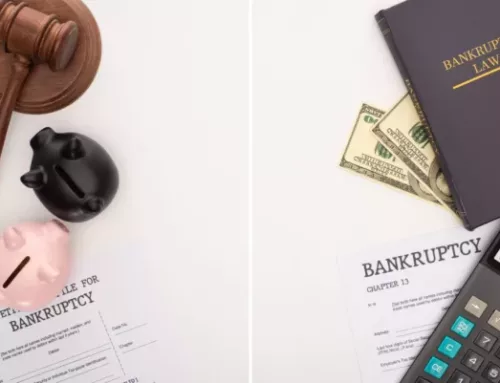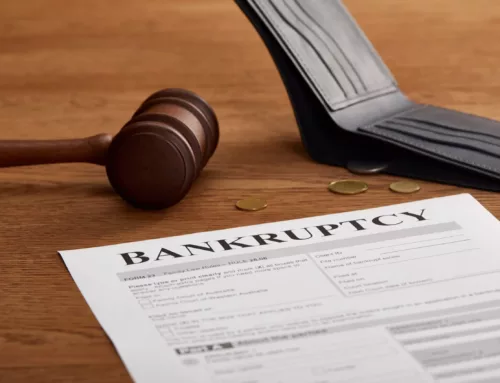Tired of Having Your Tax Garnished? Learn Ways to Achieve a Fresh Start!
Are you looking for ways to stop tax refund garnishment in bankruptcy? Look no further because our experienced bankruptcy attorneys are here to assist you! We understand the financial strain that comes with tax garnishments, and we are dedicated to helping you overcome this challenging situation.
At The Rollins Law Firm, we are committed to giving comprehensive bankruptcy solutions tailored to your case and circumstances. Our team of skilled attorneys is well-versed in the intricacies of bankruptcy law and has a deep understanding of the local legal landscape in Mississippi. With our unwavering commitment, we are here to guide you through the complex bankruptcy process, ensuring your rights are protected every step of the way. In this post, we are going to discuss the following:
- What is a Tax Refund Garnishment?
- What is the Legal Basis of Tax Refund Garnishment
- How Does a Tax Refund Garnishment Work?
- What are the 3 Ways to Stop Tax Refund Garnishment in Bankruptcy?
Don’t let tax garnishments dictate your future. Contact The Rollins Law Firm today to schedule a free consultation with our experienced bankruptcy attorneys. Together, we will work towards finding the most effective legal solutions to stop tax garnishments, protect your assets, and pave the way for a brighter financial future.
What is a Tax Refund Garnishment?
Tax refund garnishment in bankruptcy refers to the process of creditors or government agencies seizing a portion or the entirety of an individual’s tax refund to satisfy outstanding debts. This occurs when a person files for bankruptcy and has unpaid debts owed to creditors or government entities, such as the Internal Revenue Service (IRS).
What is the Legal Basis of Tax Refund Garnishment?
In Mississippi, tax refund garnishment is governed by state and federal laws. Creditors can initiate tax refund garnishment for various types of debts, including unpaid taxes, child support arrears, defaulted student loans, and other court-ordered debts. Government agencies, such as the Mississippi Department of Revenue or the Internal Revenue Service (IRS), can also intercept tax refunds to satisfy outstanding obligations.
Bankruptcy is known for it’s complicated process, and you need an attorney who will guide you. Contact us today for sound legal advice!
How Does Tax Refund Garnishment Work in Mississippi?
Tax refund garnishment is an effective method for creditors and government agencies to collect outstanding debts in Mississippi. Understanding the process of initiating tax refund garnishment is essential for both creditors seeking to recover owed amounts and individuals who may face this situation. We will explore the key steps involved in initiating the tax refund garnishment process in Mississippi.
Obtaining a Judgment
Before initiating tax refund garnishment, the creditor or government agency must obtain a judgment against the debtor. This typically involves filing a lawsuit or taking legal action to establish the debtor’s liability and determine the amount owed. Once the judgment is obtained, the creditor can proceed with the garnishment process.
Providing Notice to the Debtor
After securing the judgment, the creditor or government agency is required to provide written notice to the debtor regarding the intent to garnish their tax refund. This notice must include crucial information, such as the nature of the debt, the amount owed, and the right to challenge the garnishment.
The notice must be sent to the debtor via certified mail or another method that provides proof of delivery. It is important for creditors to ensure that the notice is sent to the debtor’s last known address to fulfill legal requirements and ensure the debtor is aware of the impending garnishment.
Allowing Time for Response
Upon receiving the notice of intent to garnish, the debtor has a specific timeframe to respond or challenge the garnishment. The exact time period varies depending on the nature of the debt and applicable laws. Debtors should carefully review the notice and consult with an attorney if they wish to challenge the garnishment.
Requesting Interception of the Tax Refund
If the debtor does not respond or challenge the garnishment within the specified timeframe, the creditor or government agency can proceed to request the interception of the debtor’s tax refund. This request is typically submitted to the Mississippi Department of Revenue or the Internal Revenue Service (IRS), depending on the nature of the debt.
The creditor or agency must provide relevant information, such as the debtor’s identification details, the amount of the debt, and the judgment obtained. The tax refund will be intercepted and applied towards satisfying the outstanding debt.
Compliance with Federal and State Limits
Tax refund garnishment in Mississippi is subject to federal and state limits to prevent excessive financial hardship for the debtor. The federal limit dictates that a maximum of 15% of the debtor’s total tax refund can be garnished, with exceptions for child support arrears and certain federal debts. Mississippi does not impose additional restrictions beyond the federal limits.
Tax refund garnishment can be confusing and overwhelming. Call The Rollins Law Firm, and our skillful attorneys can address all of your queries. Contact us today.
What are the 3 Ways to Stop Tax Refund Garnishment in Bankruptcy?
Tax refund garnishment can cause significant financial strain for individuals facing outstanding debts. However, bankruptcy provides a legal avenue for debtors in Mississippi to halt tax refund garnishment and regain control of their finances. In this section, we will explore three effective ways to stop tax refund garnishment through bankruptcy in Mississippi. Understanding these options can help individuals make informed decisions and work towards resolving their financial burdens.
Chapter 7 Bankruptcy
Chapter 7 bankruptcy, also known as liquidation bankruptcy, can effectively stop tax refund garnishment. When an individual files for Chapter 7 bankruptcy in Mississippi, an automatic stay is issued, which immediately halts all collection activities, including tax refund garnishment.
Upon filing for Chapter 7 bankruptcy, the debtor’s assets are evaluated by a court-appointed trustee. In most cases, Mississippi law allows exemptions for certain assets, including a portion or the entirety of the tax refund. The exemption depends on various factors, such as the debtor’s filing status, dependents, and specific circumstances.
By using the exemptions provided by Mississippi bankruptcy laws, debtors can protect their tax refund from garnishment and use it to rebuild their financial foundation.
Chapter 13 Bankruptcy
Chapter 13 bankruptcy, often referred to as reorganization bankruptcy, provides an alternative solution to stop tax refund garnishment while enabling debtors to repay their debts over a structured repayment plan. This type of bankruptcy is particularly useful for individuals with a regular income who wish to retain their assets and develop a manageable repayment plan.
When a debtor files for Chapter 13 bankruptcy in Mississippi, an automatic stay is initiated, preventing further tax refund garnishment. The debtor works with their attorney and the bankruptcy court to develop a repayment plan based on their income and expenses.
Under the Chapter 13 plan, debtors can propose to pay off a portion or the entirety of their debts over a period of three to five years. The plan takes into account the debtor’s income, reasonable living expenses, and the value of non-exempt assets. By adhering to the repayment plan, debtors can retain their tax refunds and fulfill their obligations through structured payments.
Challenging the Debt
Another approach to stopping tax refund garnishment in bankruptcy is by challenging the underlying debt. In some cases, the debt may be inaccurate, inflated, or subject to other legal deficiencies. Challenging the debt can be done by filing a lawsuit or disputing the debt with the creditor or collection agency.
If the debtor successfully challenges the debt during the bankruptcy process, it may be deemed invalid or reduced. As a result, the tax refund garnishment related to the disputed debt can be stopped.
Bankruptcy provides a powerful tool for individuals in Mississippi to stop tax refund garnishment and regain control of their financial situation. Whether through Chapter 7, Chapter 13, or challenging the underlying debt, bankruptcy offers relief from garnishment while enabling individuals to work towards a fresh start.
Consulting with a knowledgeable bankruptcy attorney is important to navigate the complexities of the bankruptcy process and determine the most suitable approach based on individual circumstances. Contact us today!
Looking for Ways To Stop Tax Refund Garnishment in Bankruptcy? We Got Your Back!
Ready to put an end to tax refund garnishment and regain control of your finances? Contact The Rollins Law Firm today to explore how bankruptcy can help you stop tax refund garnishment in Mississippi. Our experienced bankruptcy attorneys will provide personalized guidance, explain the available options, and develop a customized strategy to meet your specific needs. We can also help you deal with other practice areas such as personal injury, social security, and workers compensation.
Don’t let tax refund garnishment drain your financial resources any longer. With our proven track record in bankruptcy law, we are dedicated to helping you achieve the fresh start you deserve. Take action now and schedule a consultation with our skilled attorneys at The Rollins Law Firm.








Connect with Us